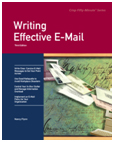Writing Effective E-Mail
Learn to write e-mail that is read & acted upon, not ignored & deleted!

Nancy Flynn, the author of Writing Effective E-Mail-in its third edition and published in English, German, Chinese, and Spanish-literally wrote the book on how to write powerful, persuasive, legally compliant e-mail.
Why concern yourself with writing effective e-mail? Every message you send is a reflection of your professionalism and your organization's credibility. In the battle for the reader's attention, thoughtfully written, carefully worded e-mail that is on-target and free from mechanical errors is sure to come out on top.
E-mail that is ill-conceived or badly written can cost your organization business and stall your career. Messages that are filled with grammar goofs, spelling slip-ups, and punctuation problems can turn off readers and call your communication skills and professionalism into question.
Tone-deaf e-mail that is offensive, hostile, or otherwise inappropriate can trigger employment terminations, workplace lawsuits, negative publicity, and other disasters. Messages that expose company secrets, customers' private data, or other eyes-only content can lead to costly and time-consuming regulatory investigations and litigation.
The easiest way to control e-mail risk is to control written content. This course teaches participants how to write effective e-mail without getting fired, sued, or publicly humiliated. Participants learn how to write effective e-mail messages and other forms of electronic content, including social media posts and text messages. Gain an understanding of e-mail/online risks and best practices. Review content, usage, and compliance. Discuss the importance of netiquette, or electronic etiquette. Discuss and learn from real-life e-mail, web, and social media disaster stories. Discuss e-mail/online risks including litigation, regulatory violations, business record mismanagement, employee terminations, security breaches, lost productivity, negative publicity, and damaged professional reputations. Review tricks and techniques to ensure that e-mail and other online content is read and acted upon, not ignored and deleted.
Learning Objectives
Participants will leave Writing Effective E-Mail armed with the skills and strategies necessary to:
- Recognize and avoid common communication and compliance risks associated with e-mail.
- Write accurate, brief, and clear e-mail messages that are read and acted upon-not ignored and deleted-by readers.
- Write civil, compliant, conversational e-mail messages that adhere to the rules of netiquette.
- Write with precision, applying correct grammar, capitalization, punctuation, and proofreading rules.
- Capture reader attention, manage mailbox clutter, and enhance productivity.
- Maximize communication while minimizing compliance risks including workplace lawsuits, regulatory investigations, and e-mail policy breaches among others.
Sample Agenda
(half-day to full-day program):
Think Before Composing Your Message
- Getting started.
- Is e-mail the most appropriate communications channel?
- Consider language and cultural barriers before using e-mail.
- Evaluate potential risks before using e-mail.
- Review e-mail communication and compliance concerns.
Crafting an Effective E-Mail Message
- Ten tips guaranteed to improve your e-mail-and other business writing.
- Apply the ABCs.
- Adhere to your unofficial "contract" with the reader.
- Write effective subject lines.
- Include a salutation and signature.
- Grab your reader's attention with a powerful lead.
- Empower your writing with the inverted pyramid.
- Get started in three easy steps.
- Strive for simplicity.
- Use the active voice.
- Write with power and precision.
Tone, Civility, and Netiquette Rules
- Writing civil, compliant, conversational e-mail.
- Use gender-neutral language.
- Avoid conversational pitfalls.
- Use business-appropriate language.
- Netiquette rules.
- Special netiquette rules for executives and managers.
Grammar, Punctuation, and Proofreading Rules
- Eliminating mechanical errors: grammar and capitalization rules.
- Punctuation rules: what you need to know.
- Proofreading rules.
Readability and Mailbox Management
- Capturing reader attention.
- Managing clutter.
- Review best practices for writing effective e-mail.
ePolicy Rules
- Understanding and adhering to your organization's e-mail policy, mobile device policy, and other electronic rules and policies.
Contact Nancy Flynn to discuss your training needs, get a quote, and schedule your program.
View our e-mail-related articles in The New York Times, The Wall Street, USA Today, Fortune, Time, and other national publications.
Client Testimonials & Book Reviews
"Really hits the mark. We're going back for more." -Accounting Professional
"She was great!!!!" -Training Manager, International Accounting & Consulting firm
"This course should be mandatory for anyone in a leadership role." -MD, Physician Leadership Academy
"Valuable and enlightening. Old grade school writing myths dispelled. Management is very impressed with the immediate impact your class had. Noticeable improvement in the effectiveness of communications skills of all who attended." -Tech Company Education Committee Chairperson
"Just excellent. You brought solid information and new insights." -Superintendent, County Juvenile Detention Center
"Writing Effective E-Mail is a must-read for everyone who sends and receives e-mail in a business setting. Presented in a no-nonsense efficient style. Take this quick course to e-mail success." -Business Librarians at the Carnegie Library, Pittsburgh Post-Gazette. (Review of Nancy Flynn's Writing Effective E-Mail.)
"Employees' surreptitious use of IM can come back and bite your business in the bottom line, so it pays to learn about the technology and impose policies and standards." -Harvard Business School, "Working Knowledge" newsletter. (Review of Instant Messaging Rules by Nancy Flynn.)
"A well-organized guide to implementing e-risk management….Delivers a high-level training program." -American Bar Association, "Business Law Today." (Review of E-Mail Rules by Nancy Flynn.)
"Top 10 risk management books....37 rules for retaining and managing e-mail in ways to reduce corporate liability. Good stuff!" -Claims magazine. (Review of E-Mail Rules by Nancy Flynn.)
View our E-Mail Rules brochure.
Contact Nancy Flynn to discuss your training needs, get a quote, and schedule your program.

Published in August 2014, Nancy Flynn's
Writing Effective E-Mail, 3rd Edition, has been completely updated with new content & exercises. Bonus: Sample e-mail, mobile device, and writing style policies that you can implement immediately.
Buy now.